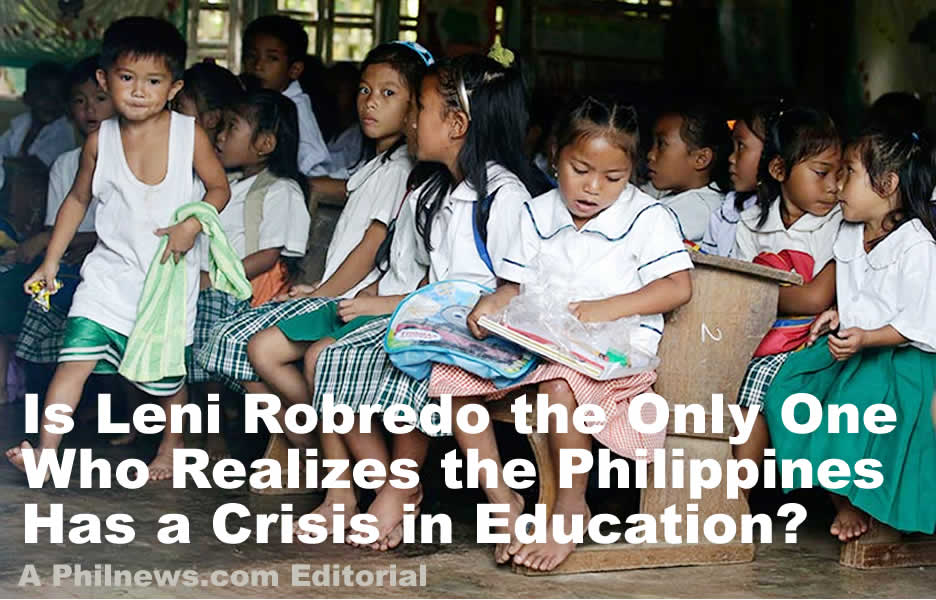 Overcrowded and poorly equipped schools hamper learning. File Photo: Steemit.com
Overcrowded and poorly equipped schools hamper learning. File Photo: Steemit.com

ice President Leni Robredo wants the government to declare a "crisis in education." We believe that is the right thing to do. The World Bank (WB) may have issued an apology for its objective assessment of the country's education systemógiven Education Secretary Leonor Briones and the Duterte administration's hysteria when the report first appearedóbut the facts in that report remain true. Compared to other countries, the Philippines ranks at or near the bottom in education.
As we pointed out in past editorials, we need leaders who will roll up their sleeves and do what it takes to fix the problem. We don't need lazy and incompetent leaders who just attack the bearers of bad news but do nothing.
According to the WB, the Philippines participated in three separate international assessment tests: the Program for International Student Assessment (PISA); the Trends in International Mathematics and Science Study (TIMSS); and the Southeast Asia Primary Learning Metrics (SEA-PLM). Unfortunately, the results from all three were equally discouraging. The WB noted that "more than 80 percent of children do not know what they should know."
Addressing the WB report, Ben O. de Vera of the Inquirer wrote, "the country was last in reading and second to last in science and mathematics among 79 countries in PISA. In TIMSS, it ranked last in both mathematics and science among 58 countries in the fourth-grade assessment. In SEA-PLM, it was among the bottom half of the six countries in reading, mathematics, and writing literacy."
Aside from academics, the WB report noted that there appeared to be a higher incidence of bullying in Philippine schools. Many students also said they attend classes feeling hungry. This lack of adequate nutrition, according to the WB, not only affected their learning ability it has also stunted their physical growth.
De Vera writes, "'One in three children under the age of 5 is stunted, which is a principal marker of malnutrition,' it said. Stunted kids are smaller in height compared to healthier children of the same age. The Washington-based multilateral lender earlier described childhood stunting due to undernutrition as a 'silent pandemic' in the Philippines. Across the East Asia and Pacific region, the Philippines had the fifth-highest stunting prevalence. Worldwide, the country was in the top 10."
The country is in dire straits. Unless our leaders address this problem immediately, the Philippines will be in worse shape tomorrow than it is today. There might not even be a Philippines a hundred years from now. Other more powerful and aggressive neighbors like Communist China can simply absorb the country and relegate Filipinos to second-class citizenship in their own land. At that future point in time, we would have become so backward; we would be incapable of even putting up a fight.
Therefore, if Vice President Robredo is the only high-ranking government official prescient enough to realize that we indeed have an existential crisis in education, maybe she should be the next president. We need a leader who will make sure that the Filipino of tomorrow will be way more intelligent than the Filipino of today. That is the only way we will survive as a nation. We must realize that science and technology are indispensable to our viability in the 21st century. And the only way to acquire mastery of both is through a first-rate education. Published 7/13/2021
|